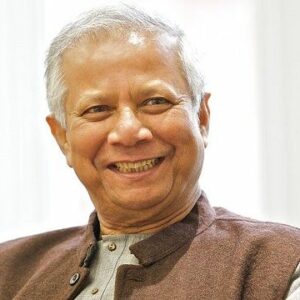Muhammad Yunus is a Bangladeshi economist and banker who founded Bangladesh’s Grameen Bank in 1983. In 2006, the Nobel Peace Prize was shared by the Grameen Bank and Yunus “for their efforts to generate economic and social development from bottom.” He researched the prevailing concepts of banking and credit in his nation, which hindered disadvantaged entrepreneurs from qualifying for bank loans, therefore depriving them of the opportunity to escape poverty. He began by providing needy basket weavers with modest personal loans, or “micro” loans, in order to help them support themselves. His ambition to aid disadvantaged people manifested itself in the founding of the Grameen Bank in 1983. Several additional banks based on the Grameen Bank business model currently operate in more than 100 countries. Yunus had always had a passion for social concerns. During the Bangladesh Freedom War in 1971, he led the Bangladesh Information Center to rally support for the liberation of his homeland, even though he was living in the United States. After a famine ravaged Bangladesh in 1974, he became interested in poverty reduction approaches. He is a member of the United Nations Foundation’s board of directors and has received various honors for his efforts.
Childhood and Adolescence of Muhammad Yunus
Muhammad Yunus was the third of 14 children born in Chittagong. Hazi Dula Mia Shoudagar, his father, was a successful jeweller, and Sufia Khatun, his mother, was a kind lady who constantly helped the needy. Five of his siblings died while he was still a child.
He went to the village school as a child before moving on to Lamabazar Primary School in Chittagong. Chittagong Collegiate School’s matriculation examination was passed by him.
He was a student at Chittagong College, where he was involved in a variety of cultural activities. He went on to Dhaka University, where he earned his B.A. and M.A.
He studied at Vanderbilt University and received his PhD in economics in 1971 after earning a Fulbright Scholarship to study in the United States.
A Career of Muhammad Yunus
From 1969 to 1972, he worked as an Assistant Professor of Economics at Middle Tennessee State University in Tennessee while obtaining his PhD. Of July 1972, he was appointed as the Deputy Chief of the General Economics Division in the Government’s Planning Commission upon his return to Bangladesh. However, he found the position to be tedious and quit in September of the same year.
He began his career at Chittagong University as an Associate Professor of Economics before rising to the position of Head of the Department of Economics. He was named Director of the Rural Economics Program in 1975, a position he held until 1989.
He began his work on founding the Grameen Bank while working at Chittagong University. In 1976, he began lending small amounts to the needy on his own, and in 1983, what had started as a pilot initiative became a full-fledged bank, the Grameen Bank, with Yunus as its Managing Director.
‘Banker to the Poor’ and ‘Creating a World Without Poverty’ are two of his books.
Major Projects of Muhammad Yunus
Yunus came up with the idea for Grameen Bank while working on a research project in the 1970s to build a financial system that would aid the poor in conquering poverty.
He began by providing little amounts of money to the impoverished in the village of Jobra in 1976. Then he approached the Central Bangladesh Bank for help in expanding micro-credit services to other areas. The project turned out to be a huge success.
A Bangladeshi government ordinance officially established the Grameen Bank in 1983. The Ford Foundation also provided assistance to the bank in the form of a grant.
Yunus’s goal in establishing the bank was to give small loans to the poor at moderate interest rates in order to encourage self-employment opportunities that would allow the impoverished to put their abilities to work and earn money. Women account for 97 percent of Grameen Bank borrowers, according to estimates.
Over the years, the Grameen Bank has expanded to include over two dozen businesses, all dedicated to societal improvement. Grameen Trust, Grameen Fund, Grameen Telecom, Grameen Shakti, and others are among them.
Achievements & Awards of Muhammad Yunus
In 1984, Yunus received the Ramon Magsaysay Award for ‘Community Leadership’ for “Enabling the neediest rural men and women to make themselves productive through sound group managed credit.”
In 1987, he received Bangladesh’s highest civilian national accolade, the Independence Day Award, for his remarkable commitment to rural development.
For his work in establishing a “uniquely pragmatic and practical technique of encouraging poor women and men to engage on income-generating activities,” he got the 1993 Humanitarian Award from CARE, USA.
In 1994, the World Food Prize Foundation in the United States of America awarded him the World Food Prize for “his innovative approach to fostering the economic and social empowerment of Bangladesh’s poorest inhabitants, particularly women and children.”
In 2006, Yunus and Grameen Bank shared the Nobel Peace Prize for their “efforts to generate economic and social development from below.”
Personal History and Legacy
In 1970, he married Vera Forostenko, a Russian literature student. They only had one child and divorced soon after she was born.
He is currently married to physics professor Afrozi Yunus. From his second marriage, he has a daughter.
Estimated Net Worth
Muhammad Yunus is a Bangladeshi entrepreneur, bank, civil society leader, and economist who has a net worth of $10 million.
Trivia
Due to his advanced age, the Bangladesh government forced him to resign as chairman of the Grameen Bank in 2011.
He is the first Bangladeshi to win the Nobel Prize for Literature.
More than 100 international prizes from 26 nations have been bestowed upon him.
In his honor, the 14th of January has been designated as “Muhammad Yunus Day” in Houston, Texas.


